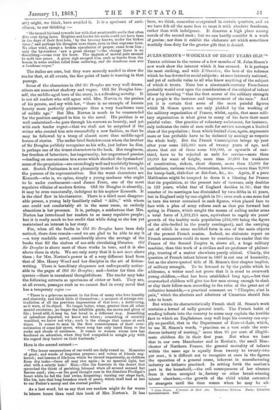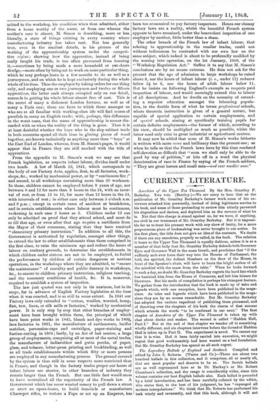JULES SLMON'S "WORKMAN OF EIGHT YEARS OLD."*
THREE editions in the course of a few months of M. Jules Simon's new work show the interest which it has aroused. It is perhaps the most striking, and with L'Ouvribv, the best of the volumes which he has devoted to social subjects ; at once intensely national, and yet of catholic value to all who know anything of the subject of which it treats. None but a nineteenth-century Frenchman probably would ever open the consideration of the subject of infant labour by showing "that the first secret of the military strength of a people is the increase and improvement of the race." And yet it is certain that some of the most painful figures which M. Simon quotes are only yielded by the working of the military organization of France, whilst, again, that same mili- tary organization is what gives to many of his facts their most painful value. Our practice of voluntary enlistment, for instance, only indicates the ratio of men unfit for service amongst a limited class of the population ; from which limited class, again, arguments more or less probable have to be deduced by analogy as respects the whole body. But the French Conscription brings up year after year some 325,00) men of twenty years of age, and shows that out of these some 109,000, or upwards of one- third, have to be rejected as unfit for service—more than 18,000 for want of height, more than 30,000 for weakness of constitution, rickets, chest disease, more than 15,000 for mutilations, varicose veins, rheumatism, hernia,—more than 9,000 for hump-back, club-foot or flat-foot, &c., &c. Again, if a pare Malthusian might be tempted to deem it a blessing for France that its population, at the present rate of increase, only doubles in 122 years, whilst that of England doubles in 50; that the number of its marriages has diminished by two-fifths in 41 years, but in England only by one-eighth in 70; even such a one must feel in turn the terror contained in such figures, when placed face to face with a plan of army reform such as that put forward last spring in France, which sought the means of calling under arms a total force of 1,232,215 men, equivalent to nearly six years' growth of the healthy male population (216,000 being the figure of the able-bodied in the yearly contingent), and the carrying out of which in some modified form is one of the main objects of the present French session. Indeed, no elaborate report on French armaments could do more to convince the reader that the France of the Second Empire is, above all, a huge military machine, than this work of a civilian and ex-professor of philoso- phy, treating of a matter elsewhere purely ethical. Clearly, the question of French infant labour in 1867 is not one of humanity, but as the above-quoted title of M. Simon's first chapter implies, of military strength. To be listened to by the public which he addresses, a writer need not prove that it is cruel to overwork young children,—that has been established long ago,—but that overworked children will give too few men strong enough to slash or slay their fellow-men according to the rules of the great act of collective homicide,—a practical comment on " l'Empire, c'est la paix," which the abettors and admirers of Casarism should fain take to heart.
But within its characteristically French shell M. Simon's work contains a kernel of sadly general truth. The French habit of sending infants into the country to nurse may explain the terrible fact to which an Englishman may well hope his country can sup- ply no parallel, that in the Department of Eure-et-Loir, which, to use M. Simon's words, "practises on a vast scale the mur- derous industry of nursing," more than 95 per cent. of illegiti- mate children die in their first year. But when we hear that in our own Manchester and in Roubaix, the small Man- chester of Northern France, the general mortality of infants within the same age is equally from twenty to twenty-two per cent., it is difficult not to recognize at once in the figures the operation of a general cause, inherent in manufacturing industry as hitherto practised. In setting forth the mother's part in the household,—the evil consequences of her absence from it when occupied in factory or other bread-winning labour elsewhere,—the growth of the child whilst entrusted to strangers until the time comes when he may be ad-
• Jules Sheen. L'Ourrier de Huit Ans. Troisno EJ:Con. Paris: Librairio Internationale. 1867. raitted to the workshop, his condition when thus admitted, either from a home worthy of the name, or from one whence the mother's care is absent, M. Simon is describing, more or less literally, a state of things existing in every country where manufacturing industry has taken root. Not less generally true, even in the smallest details, is his picture of the working of the apprenticeship system under the competi- tive re:gime ; showing how the apprentice, instead of being really taught his trade, is too often prevented from learning it,—sometimes by being made a mere household or oat-doors drudge,—more of ten by being set to work on some particular thing, which he may perhaps learn in a few months to do as well as a journeyman, and on which he is kept exclusively during the whole whole of his time. Thus the employer by taking orders for one thing only, and employing one or two journeymen and twelve or fifteen apprentices, the latter each always occupied only on one detail, succeeds in getting his whole labour almost free of cost. This is the secret of many a dishonest London fortune, as well as of many a Paris one ; these are facts to which those amongst us who are at all familiar with working-class life will find scores of parallels in many an English trade; with, perhaps, this difference in the worst cases, that the name of apprenticeship is sooner dis- carded with us when the reality of the thing is gone. Thus it is at least doubtful whether the boys who in the slop cabinet trade in both countries spend all their time in glueing pieces of wood together, are known technically as anything more than "boys" at the East End of London, whereas, from M. Simon's pages, it would appear that in France they are still mocked with the title of apprentices.
From the appendix to M. Simon's work we may see that French legislation, as respects infant labour, divides itself under two heads. A law of March 22, 1841, which corresponds to the body of our Factory Acts, applies, first, to all factories, work- shops, &c., worked by mechanical power, or by "continuous fire ;" and second, to all workshops containing more than 20 workmen. In these, children cannot be employed before 8 years of age, nor between 8 and 12 for more than 8 hours in the 24, with an inter- val of rest, or from 12 to 16, for more than 12 hours in the 24, with intervals of rest ; in either case only between 5 o'clock a.m. and 9 p.m. ; except in certain cases of accident or breakdown, and in certain establishments where labour must be continuous, reckoning in such case 2 hours as 3. Children under 12 can only be admitted on proof that they attend school, and must do so till that age, or even after that age require a certificate from the Mayor of their commune, stating that they have received "elementary primary instruction." In addition to all this, the Government is authorized by regulation, amongst other things, to extend the law to other establishments than those comprised in the first class, to raise the minimum age and reduce the hours of labour on sanitary grounds, to determine the establishments in which children under sixteen are not to be employed, to forbid the performance by children of certain dangerous or noxious operations, in the workshops where they are admitted, to "ensure the maintenance" of morality and public decency in workshops, &c., to ensure to children primary instruction, religious teaching, and the necessary conditions of health, &c. It is, moreover, required to establish a system of inspection.
The law just quoted was not only in its neatness, but in its scope, far in advance of English Factory legislation at the time when it was enacted, and is so still to some extent. In 1841 our Factory laws only extended to "cotton, woollen, worsted, hemp, flax, tow, linen, or silk mills or factories," worked by mechanical power. It is only step by step that other branches of employ- ment have been brought within them, the principal of which have been print works in 1845, bleach and dye works in 186Q, lace factories in 1861, the manufacture of earthenware, lucifer matches, percussion-caps and cartridges, paper-staining and fustian-cutting in 1864; lastly, by an Act of last session, a large group of employments, comprising all or most of the metal trades, the manufacture of indiarubber and gutta percha, of paper, glass, and tobacco, letter-press printing and bookbinding, as well as all trade establishments within which fifty or more persons are employed in any manufacturing process. The ground covered by the system is thus still in some respects more restricted than in France, and though in the factory trades proper our hours of infant labour are shorter, in other branches of industry they remain longer than the French. But one little fact would seem to have neutralized all the superiority of the French law. A Government which has never wanted money to pull down a street or erect an opera-house, to build ironclads or manufacture Chassepot rifles, to restore a Pope or set up an Emperor, has been too economical to pay factory inspectors. Hence our clumsy factory laws are a reality, whilst the beautiful French system appears to have remained, under the benevolent inspection of one employer by another, little better than a sham.
The other branch of the French law of infant labour, that relating to apprenticeship in the smaller trades, could not without tediousness be contrasted with our own law on the same subject, which indeed is about to be profoundly modified by the coming into operation, on the 1st January, 1868, of the "Workshop Regulation Act." Suffice it to say that M. Simon's conclusions are by no means extreme. He does not ask for the present that the age of admission to large workshops be raised above 8, nor the hours of infant labour (i. e., under 12) reducect below 5 to 6, nor the hours of adult labour below 11. But he insists on following England's example as respects paid inspection of labour, and would seemingly extend this to labour of all descriptions. And he dwells on the necessity of extend- ing a superior education amongst the labouring popula- tion, in the double form of what he terms professional schools, where theoretic instruction is given of a general nature, but capable of special application to certain employments, and of special schools, aiming at specifically training pupils for certain definite employments—the former of which, according to his view, should be multiplied as much as possible, whilst the latter need only exist in great industrial or agricultural centres.
It may now be added that none of M. Simon's works hitherto is written with more verve and brilliancy than the present one; as when he tells us that the French laws have by this time rendered self-devotion so difficult that "soon we shall only be able to do good by way of petition," or hits off in a word the physical deterioration of race in France by saying of the French soldiers, "They are great heroes and small men—and ever smaller ones."































 Previous page
Previous page